(House of Bhakti) – The glories of Hanumān
The following is a transcription of a discourse delivered by Śrīla Bhaktivedānta Nārāyaṇa Mahārāja in San Francisco, on May 23, 2003
(Every year, on every tour, in practically every country, Śrīla Bhaktivedānta Nārāyaṇa Mahārāja discusses the five kinds of bhaktas and their five kinds of bhakti. He does this so that his audiences understand what is real bhakti, what kind of bhakti they should choose, and what they will have to do and give up to attain it. In San Francisco, On May 23, 2003, his discourse concentrated on the glories of Hanumān, the perfect example of a premī-bhakta.)
Now we are coming to our subject – where we left off in Badger. Why do we prefer Ambarīṣa Mahārāja over 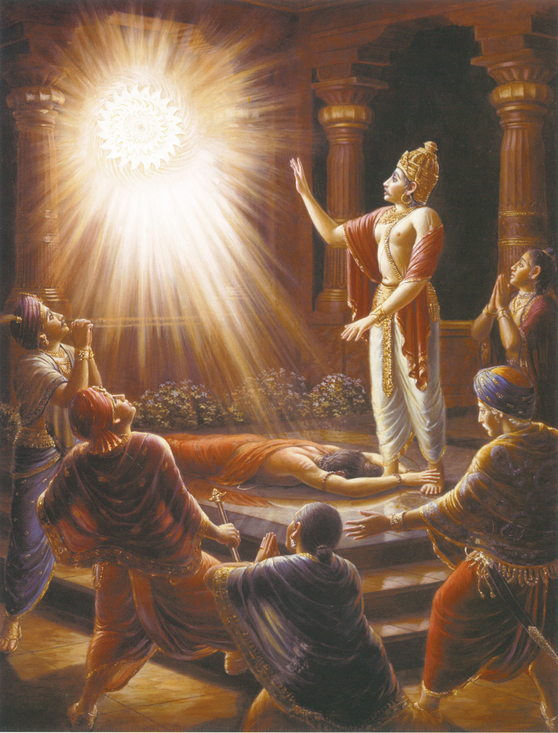 Prahlāda Mahārāja? Prahlāda Mahārāja is a siddha-bhakta and parama-mahābhāgavata (a perfected devotee situated at the stage of prema, love of God), and Ambarīṣa Mahārāja is a sādhaka-bhakta (a practitioner at the stage of bhāva-bhakti). So why do we want to follow Ambarīṣa Mahārāja?
Prahlāda Mahārāja? Prahlāda Mahārāja is a siddha-bhakta and parama-mahābhāgavata (a perfected devotee situated at the stage of prema, love of God), and Ambarīṣa Mahārāja is a sādhaka-bhakta (a practitioner at the stage of bhāva-bhakti). So why do we want to follow Ambarīṣa Mahārāja?
Prahlāda Mahārāja serves Lord Nṛsiṁhadeva, an expansion of Kṛṣṇa, whereas Ambarīṣa Mahārāja was serving Kṛṣṇa Himself. He was serving Kṛṣṇa, but in the form of a deity. He used to do praṇāma to the deity. He used to travel in Vraja-maṇḍala when Śrī Kṛṣṇa was not there. It is very rare to see Śrī Kṛṣṇa playing in Vṛndāvana. He told Śrī Nārada Muni, “Hanumān is superior to me – much more superior. If you want to see a high-class recipient of Śrī Kṛṣṇa’s mercy you should go to Hanumānjī. You can see him in Sāketa, Ayodhyā. So please go there.” The following verse is the barometer of bhakti.
anyābhilāṣitā-śūnyaṁ
jñāna-karmādy-anāvṛtam
ānukūlyena kṛṣṇānu-
śīlanaṁ bhaktir uttamā
(Śrī Bhakti rasamṛta-sindhu 1.1.11)
“The cultivation of activities that are meant exclusively for the pleasure of Śrī Kṛṣṇa, or in other words, the uninterrupted flow of service to Śrī Kṛṣṇa, performed through all endeavours of the body, mind, and speech, and through the expression of various spiritual sentiments (bhāvas), which is not covered by jñāna (knowledge aimed at impersonal liberation) and karma (reward-seeking activity), and which is devoid of all desires other than the aspiration to bring happiness to Śrī Kṛṣṇa, is called uttama-bhakti, pure devotional service.”
When Lord Rāma told Hanumān that the bridge was now completed and no more mountains were required, it so 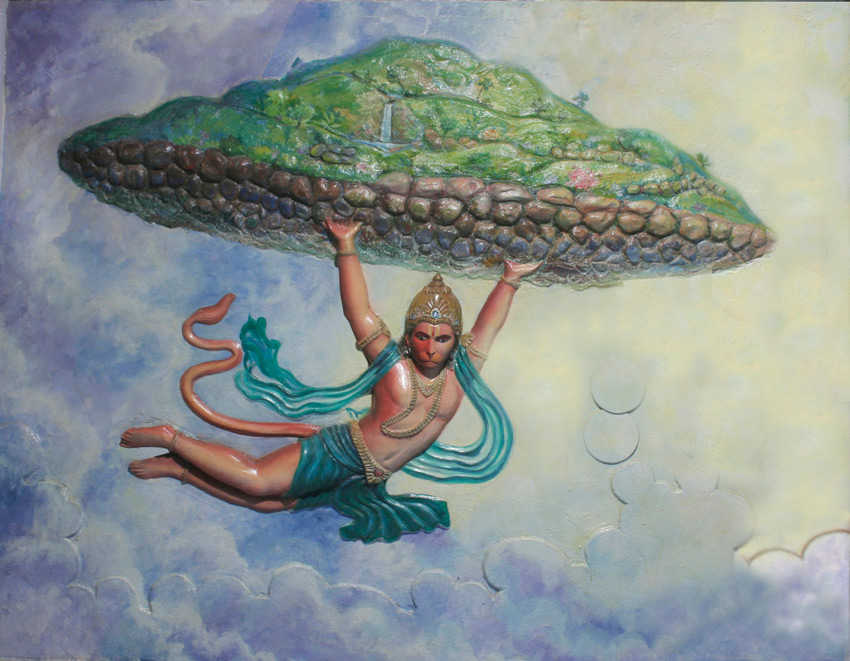 happened that Hanumān was flying over Vraja. He put Govardhana down and assured him that he would become the platform for Śrī Kṛṣṇa’s pastimes in the future.
happened that Hanumān was flying over Vraja. He put Govardhana down and assured him that he would become the platform for Śrī Kṛṣṇa’s pastimes in the future.
The symptoms of pure bhakti explained in this verse will be applied everywhere – in the case of Dhruva Mahārāja, in the case of Prahlāda Mahārāja, and also in the same way for Ambarīṣa Mahārāja. This verse is the barometer, and we can judge the supremacy of any devotee by it. You should know the meaning of “ānukūlyena kṛṣṇānu-śīlanaṁ”. There should be no worldly desire. Bhakti should not be covered by any jñāna or karma. Our bhakti should be continuous, like honey flowing, and under the guidance of an exalted Vaiṣṇava. “Ānukūlyena” – it should be without pratikūla-bhāva, an unfavourable mood. “Śilanam”- it is performed by all endeavours of the senses, mind, body and mood – the mood of bhāva, sneha, māna, praṇaya, rāga, anurāga, and so on. Ānu means under the guidance of pure devotees.
Now we may see what Hanumān is doing. We may see whether or not his bhakti is covered with jñāna (knowledge aimed at impersonal liberation) or karma (fruitive activity).
He never has any worldly desire. His only desire is to serve Lord Śrī Rāma. His activities therefore, are uttama-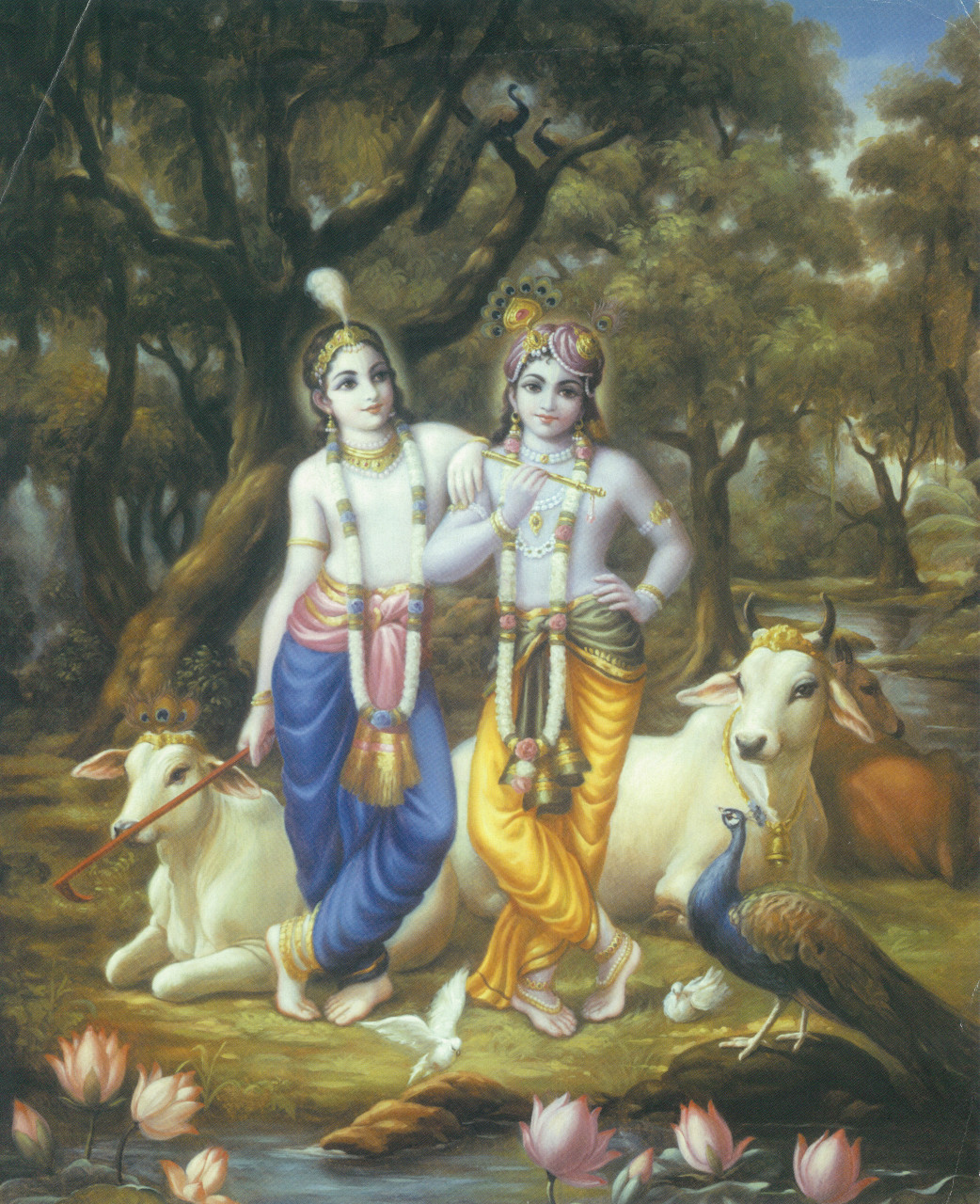 bhakti. He cannot forget Śrī Rāma for even a moment. Which high-class Vaiṣṇava is he under the guidance of, in his performance of all his services to Śrī Rāma? Can you decide? Hanumān is the incarnation of Śaṅkara, Lord Śiva, and Śaṅkara always worships his Iṣṭadeva (worshipable deity), Saṅkarṣaṇa. Do you understand this? Saṅkarṣaṇa is Balarāma, and in rāma-līlā Balarāma appears as Lakṣmaṇa. So Hanumān is always serving under the guidance of Lakṣmaṇa.
bhakti. He cannot forget Śrī Rāma for even a moment. Which high-class Vaiṣṇava is he under the guidance of, in his performance of all his services to Śrī Rāma? Can you decide? Hanumān is the incarnation of Śaṅkara, Lord Śiva, and Śaṅkara always worships his Iṣṭadeva (worshipable deity), Saṅkarṣaṇa. Do you understand this? Saṅkarṣaṇa is Balarāma, and in rāma-līlā Balarāma appears as Lakṣmaṇa. So Hanumān is always serving under the guidance of Lakṣmaṇa.
How can you understand that he is always under the guidance of Lakṣmaṇa? Is there any pastime to give evidence for this? There are so many. He took Lord Rāmacandra on his shoulders, and he also served Lakṣmaṇa in the same way, on many occasions.
When Lord Rāma was looking for Sītā-devī, Hanumān disguised himself as a brāhmaṇa, and by questioning both Rāma and Lakṣmaṇa and thus realizing their identities, he told them both, “Come and sit on my shoulders. I will take you to Kiṣkindhā, there Sugrīva is very upset. I think it will be very important for you to be friends with him.” He told Rāma, “Sugrīva will discover your Sītā and somehow bring her to You, but you will have to kill his enemy – who has taken his kingdom and very beautiful wife.”
Another time, when a śakti weapon was thrown by Meganātha at Lakṣmaṇa and Lakṣmaṇa became unconscious, as if he was dead, it was Hanumān who brought sanjīvāṇī (a powerful life-returning herb). While looking for that plant, Hanumān could not recognize it. He had been told that he would be able to recognize it because it would be situated on a certain mountain and was illuminated like light, but it so happened that the demons made all the plants in that mountain illuminate. He therefore took the entire mountain on his head and returned to Lakṣmaṇa on the very same night.
Suṣeṇa was Rāvaṇa’s ayurvedic doctor and he was not willing to come to help. Therefore, Hanumān lifted his whole house, brought him there, and convinced him to serve. He told the doctor, “Your business is to serve all, without any prejudice. For a doctor there is no consideration of enemy or friend. If an enemy comes to you, you should help him. So you should cure Rāma.” And he did so.
Once, Śrī Rāma and Lakṣmaṇa were bound by nāga-pāśa (snake ropes). They had fallen unconscious and were  about to die. By the instruction of Nārada Ṛṣi, Hanumān brought Garuḍa from Vaikuṇṭha. When Garuḍa arrived, just by smelling the scent of his body, all the snakes fled. Garuḍa then had a doubt. He thought, “Who is this person? Can it be Rāma, the Supreme Personality of Godhead? No, this person can never be Rāma. I’m the servant of Lord Rāma. By the mere glance of Rāma those snakes would have all left immediately. They would not be able to even come to Rāma, yet they were binding this person. When I came, by my influence, they quickly gave up this person. So who is He?”
about to die. By the instruction of Nārada Ṛṣi, Hanumān brought Garuḍa from Vaikuṇṭha. When Garuḍa arrived, just by smelling the scent of his body, all the snakes fled. Garuḍa then had a doubt. He thought, “Who is this person? Can it be Rāma, the Supreme Personality of Godhead? No, this person can never be Rāma. I’m the servant of Lord Rāma. By the mere glance of Rāma those snakes would have all left immediately. They would not be able to even come to Rāma, yet they were binding this person. When I came, by my influence, they quickly gave up this person. So who is He?”
Garuḍa went to his Gurudeva, Śaṅkara, but his Gurudeva told him, “I have no time; I’m going just now. You should go to Kākabhuśuṇḍi. You are the king of birds, so you should go to the most wretched among all birds – a crow. You should go there.”
Śaṅkara gave this instruction to remove Garuḍa’s pride. Garuḍa approached Kākabhuśuṇḍi. He heard from him the glory of Śrī Rāma for many years and all kinds of doubts went away. This was only due to Hanumān.
Hanumān was doing “ānukūlyena kṛṣṇānu-śīlanaṁ.” As honey flows from a jar without obstruction, Hanumān served Lord Rāma day and night. We should learn how to serve from him.
Ambarīṣa Mahārāja was serving Śrī Kṛṣṇa, but in the form of a deity – not directly. A deity will not say to His worshipper, “Oh, you should bring water.” In some rare cases – in the case of a high-class devotee like Śrīla Rūpa Gosvāmī or Śrīla Sanātana Gosvāmī, He may say, “I am very thirsty”, or anything like that. But He will not generally say anything.
Sītā-devī, Bharata, Lakṣmaṇa and Śatrughna are all servants of Lord Rāma. Sītā-devī is His wife and the others are His brothers. They had a meeting and complained to each other, “Hanumān is always serving Rāma, from the beginning of the day to the end of the day. He gives no time for us to serve. He is fanning with a cāmara, massaging, bringing food, and performing a multitude of other services. When can we serve? We four, combined, should take over all of Rāma’s services, day and night. Hanumān should have no time to even enter 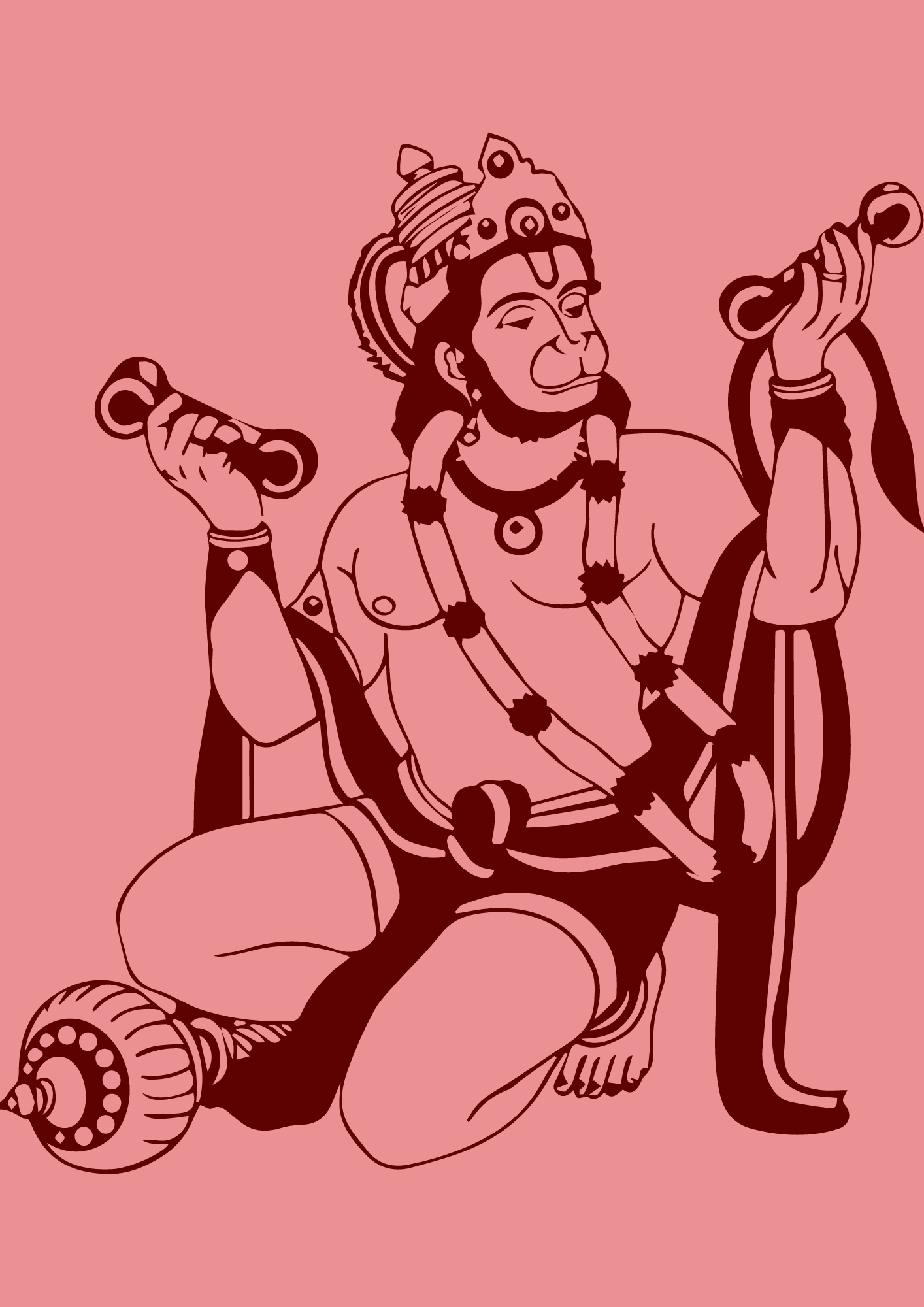 the palace.” Thus they divided all Rāma’s services amongst themselves.
the palace.” Thus they divided all Rāma’s services amongst themselves.
They decided that at night time, no one would be allowed to approach Rāma, for that was Sītā-devī’s time to serve. In the daytime sometimes Bharata, sometimes Lakṣmaṇa, and sometimes Śatrughna would serve. In this way they divided all the services of the eight yāmas (parts of the day).
Hanumān began to weep, and prayed to them, “Please don’t do this to me. Please give me any insignificant service – otherwise I cannot survive. I will die.” Can you be like Hanumān, thinking that without service you will die? When you think like that you will actually be a servant of Śrī Kṛṣṇa. Hanumān was always meditating, always performing kīrtana, always hearing hari-kathā from the Gandharvas, and always offering praṇāma.
sa vai manaḥ kṛṣṇa-padāravindayor
vacāṁsi vaikuṇṭha-guṇānuvarṇane
karau harer mandira-mārjanādiṣu
śrutiṁ cakārācyuta-sat-kathodaye
mukunda-liṅgālaya-darśane dṛśau
tad-bhṛtya-gātra-sparśe ’ṅga-saṅgamam
ghrāṇaṁ ca tat-pāda-saroja-saurabhe
śrīmat-tulasyā rasanāṁ tad-arpite
pādau hareḥ kṣetra-padānusarpaṇe
śiro hṛṣīkeśa-padābhivandane
kāmaṁ ca dāsye na tu kāma-kāmyayā
yathottamaśloka-janāśrayā ratiḥ
(Śrīmad-Bhāgavatam 9.4.18-20)
“Mahārāja Ambarīṣa always engaged his mind in meditating upon the lotus feet of Kṛṣṇa, his words in describing the glories of the Lord, his hands in cleansing the Lord’s temple, and his ears in hearing the words spoken by Kṛṣṇa or about Kṛṣṇa. He engaged his eyes in seeing the Deity of Kṛṣṇa, Kṛṣṇa’s temples and Kṛṣṇa’s places like Mathurā and Vṛndāvana, he engaged his sense of touch in touching the bodies of the Lord’s devotees, he engaged his sense of smell in smelling the fragrance of tulasī offered to the Lord, and he engaged his tongue in tasting the Lord’s prasāda. He engaged his legs in walking to the holy places and temples of the Lord, his head in bowing down before the Lord, and all his desires in serving the Lord, twenty-four hours a day. Indeed, Mahārāja Ambarīṣa never desired anything for his own sense gratification. He engaged all his senses in devotional service, in various engagements related to the Lord. This is the way to increase attachment for the Lord and be completely free from all material desires.”
Ambarīṣa Mahārāja was doing the same thing as Hanumān, but Hanumān was doing it in a superior way. 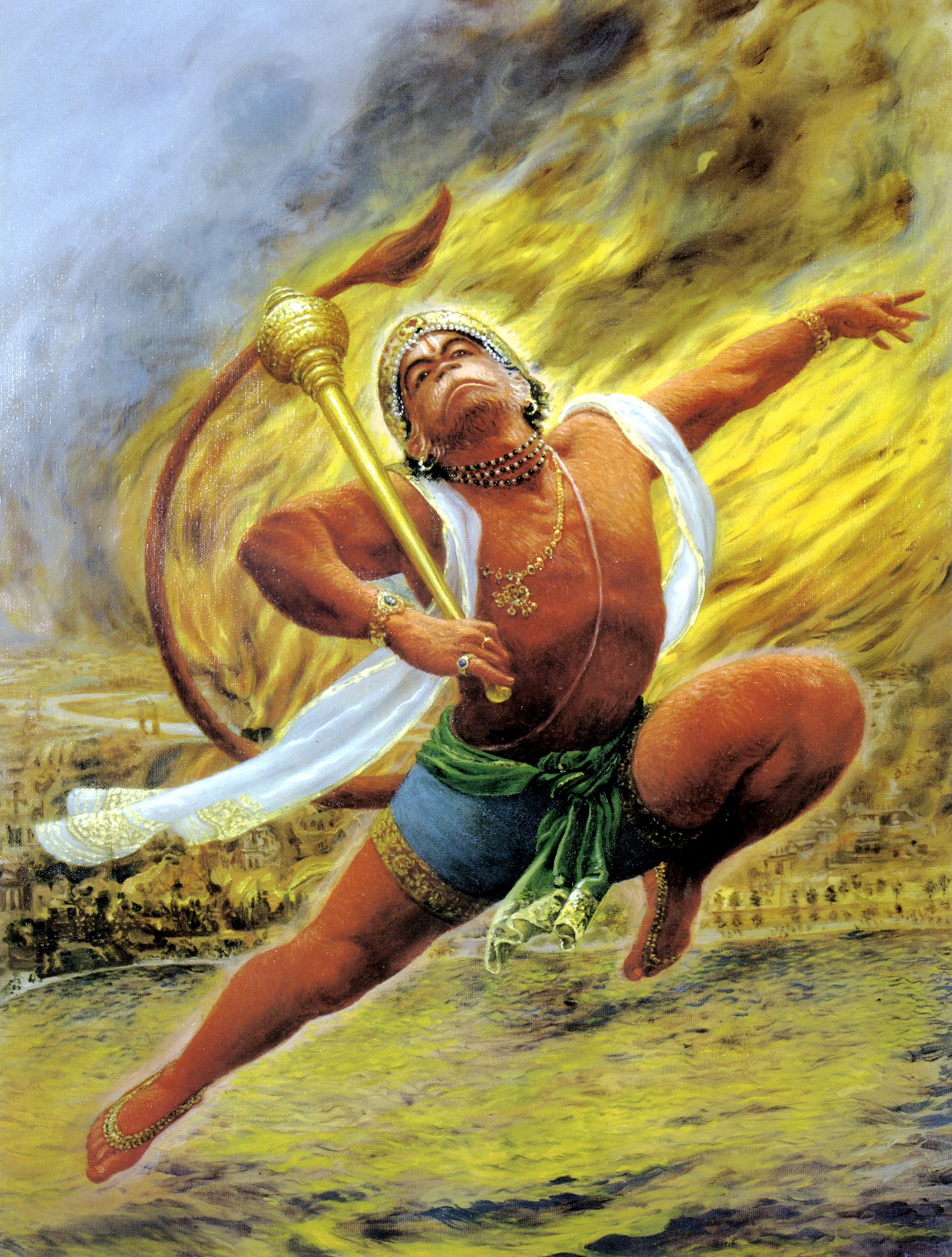 Mahārāja Ambarīṣa was travelling throughout Vraja, doing parikramā; and what was Hanumān doing? He was jumping over the ocean to bring Sītā-devī back to Lord Rāma. He burned Laṅkā. He did everything needed. He engaged his mind, his body, his soul, his senses and his moods. He was directly serving – not serving a deity as Ambarīṣa Mahārāja was.
Mahārāja Ambarīṣa was travelling throughout Vraja, doing parikramā; and what was Hanumān doing? He was jumping over the ocean to bring Sītā-devī back to Lord Rāma. He burned Laṅkā. He did everything needed. He engaged his mind, his body, his soul, his senses and his moods. He was directly serving – not serving a deity as Ambarīṣa Mahārāja was.
Hanumān told Sītā, Lakṣmaṇa, Bharata and Śatrughna, “Please give me any service. It may be a third-class bogus service, but I want it.” They thought, and they discussed amongst each other, “What service can we give him?” “Nothing,” they decided. Then he said, “I have a suggestion. Śrī Rāmacandra has never yawned – but it may come. I will stay outside his room, and when He will yawn I will snap my fingers. This service should be given.” Snapping of fingers when a person yawns is a message to “take care” and to remember Kṛṣṇa. The four discussed Hanumān’s proposal and decided that since in His whole life Rāmacandra had never yawned, there would be no harm in Hanumān taking that service.
Hanumān remained sitting on the outside of the house. He sang, “Jaya Rāma, Jaya Rāma, Jaya Jaya Rāma,” and snapped his fingers continuously. Lord Rāmacandra then began to yawn – only yawning throughout the entire day and night – and all services by Sītā, Lakṣmaṇa, Bharata and Śatrughna had to be stopped. They began thinking, “What to do now? This Hanumān is the root of all evil.” They went to Rāma, and Rāma advised them, “Oh, please give him service; otherwise he will not be able to remain alive.”
We should try to be like Hanumān – always serving. You cannot directly serve Śrī Kṛṣṇa or Śrī Caitanya Mahāprabhu. You can serve Them in Their deity forms, but not directly. Fortunately, however, Kṛṣṇa has appeared in the form of Śrī Guru, in the form of the most elevated devotee. He appears as the bona fide dīkṣā- and śikṣā-gurus. The symptoms of Śrī Guru are told in Śrīmad-Bhāgavatam and other śāstras. Why we should not always serve them?
Don’t be like a pendulum. Never give more importance to your jobs and money than to bhakti. During a  discussion at a devotee’s house earlier today, I asked another devotee, “What job do you do?” He said, “I have such and such job.” “What is your income monthly?” “At least $1000.” “What do you do with this money?” “I give some money to pay the rent of the house, some to support my children and wife and others, some for a car, and some for here and there.” “How much do you save?” “Oh, hardly anything.” “But can they help you? Can they make you happy? They can never do so. Even if you can collect millions of dollars for them, are they able to help you and make you happy? No.”
discussion at a devotee’s house earlier today, I asked another devotee, “What job do you do?” He said, “I have such and such job.” “What is your income monthly?” “At least $1000.” “What do you do with this money?” “I give some money to pay the rent of the house, some to support my children and wife and others, some for a car, and some for here and there.” “How much do you save?” “Oh, hardly anything.” “But can they help you? Can they make you happy? They can never do so. Even if you can collect millions of dollars for them, are they able to help you and make you happy? No.”
Then I asked him, “What is the aim of your life?” “Kṛṣṇa-bhakti,” he replied. “Then how much are you spending out of each thousand dollars for Guru and Vaiṣṇavas, and bhakti?” He began to think, and replied, “Nothing.” “You are giving so much importance to your job. Because of your job you cannot come to Badger to hear hari-kathā, and you are not even coming here. You are not spending even a part of one penny for Kṛṣṇa. You are giving importance to your worldly relatives – not to bhakti, bhaktas, or Kṛṣṇa. Are you doing something for Kṛṣṇa?” “Oh, I am remembering.” “But what are you doing with that money? Are you even spending a single penny in His service?” So you should also see what you are doing.
Hanumān was a brahmacārī from the beginning of his life. He never married because he thought, “My energy will then go towards family members. Why should I not serve Lord Rāma from the beginning?”
Once he saw Sītā-devī, whom he considered to be “Mother Sītā,” when she was in the dressing room. She had 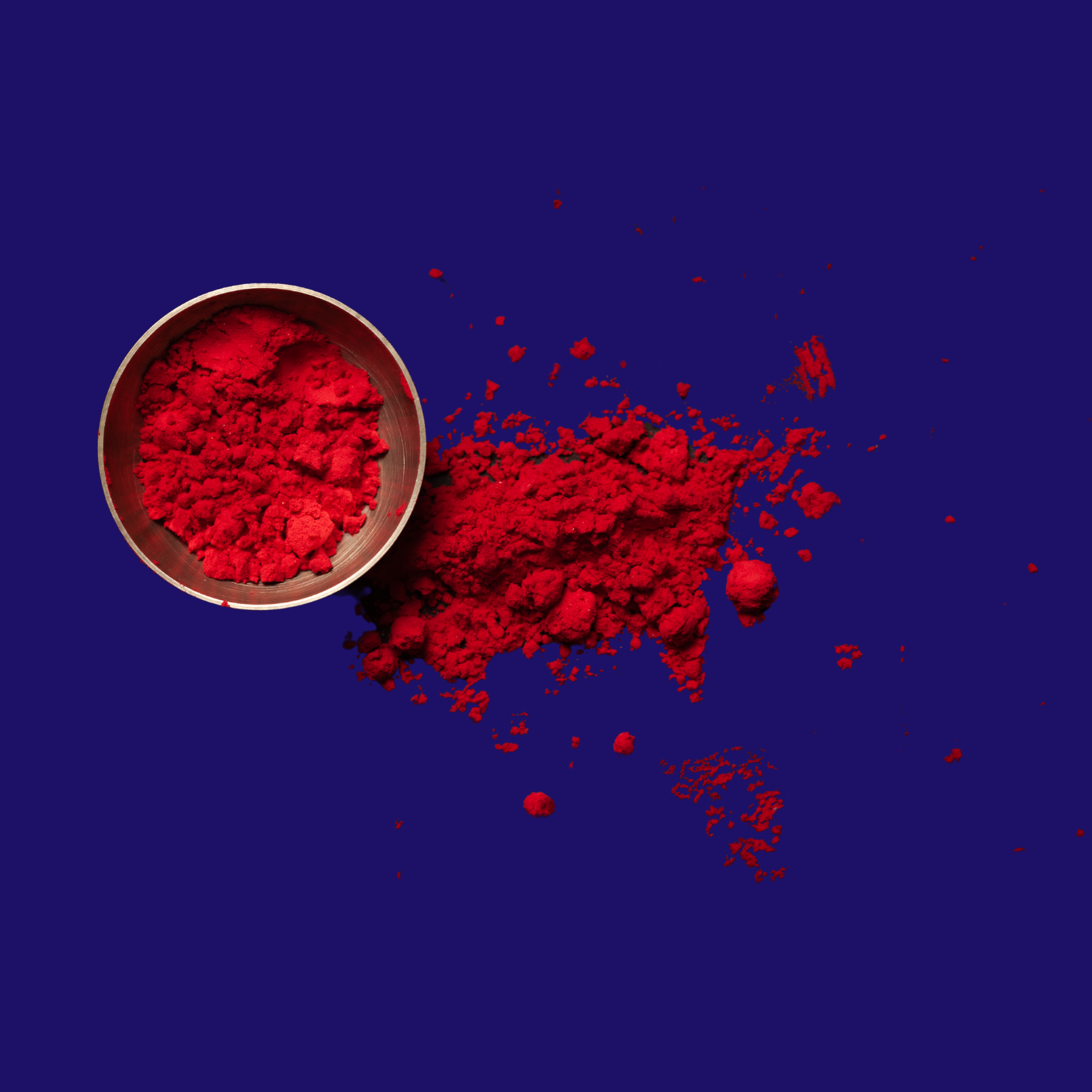 already bathed, and now she was decorating herself to prepare for entering the assembly of Śrī Rāma. She had put on all of her ornaments, and now she was placing sindūra (vermilion) powder on the part of her hair. This is the symptom of a chaste lady whose husband is alive, and this is considered a very fortunate condition for a woman. Hanumān said, “Mother, I was searching for you. What are you doing here? What is this red colour, and why are you anointing your head with it?” She replied, “I am wearing this so that your Prabhu, my husband, will be always glorious, have a long life and always be happy. By this he will surely benefit.”
already bathed, and now she was decorating herself to prepare for entering the assembly of Śrī Rāma. She had put on all of her ornaments, and now she was placing sindūra (vermilion) powder on the part of her hair. This is the symptom of a chaste lady whose husband is alive, and this is considered a very fortunate condition for a woman. Hanumān said, “Mother, I was searching for you. What are you doing here? What is this red colour, and why are you anointing your head with it?” She replied, “I am wearing this so that your Prabhu, my husband, will be always glorious, have a long life and always be happy. By this he will surely benefit.”
Sītā-devī then left and Hanumān entered the dressing room. He took all the red powder, mixed it with oil, and coloured himself from top to bottom. When he reached the assembly of Lord Rāma, all those present laughed when they saw him.
Lord Rāma asked him, “What have you done?” Hanumān replied, “Oh Prabhu, I have done this because, if Mother Sītā keeps a small amount of this reddish powder on her hair You will be happy and have a long life, then I should put it everywhere on my body.” This is how he serves Lord Rāma.
He also becomes the chariot of Rāma. He creates a fort by his tail and no one can enter the gate. He sits as a 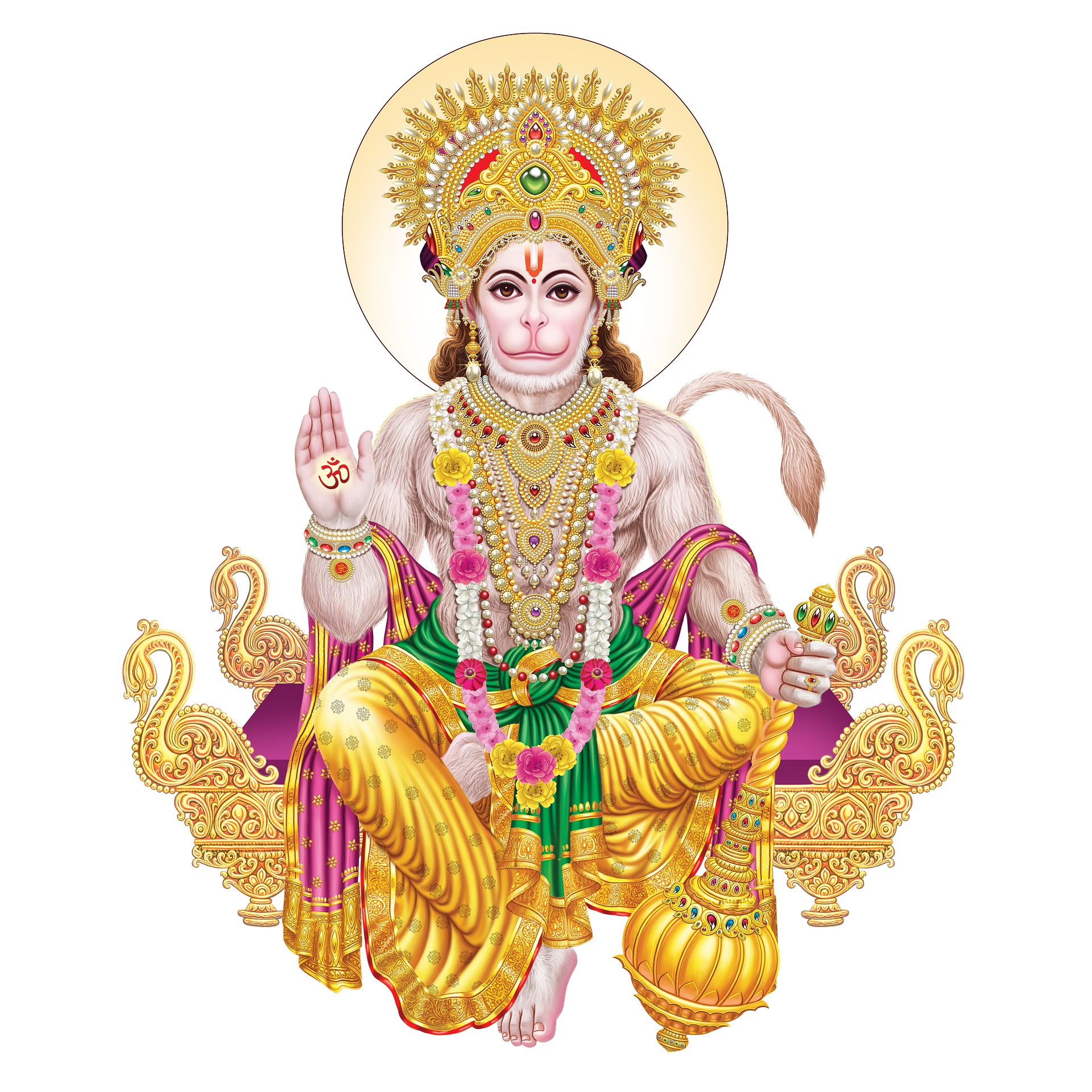 heroic guard, protecting Rāma. He brings fruit and everything else required by Rāma, Lakṣmaṇa and Sītā-devī. Thus, in all ways, he is Lord Rāma’s most obedient servant – and he can give his life for Rāma. He is therefore an even greater servant than Ambarīṣa Mahārāja.
heroic guard, protecting Rāma. He brings fruit and everything else required by Rāma, Lakṣmaṇa and Sītā-devī. Thus, in all ways, he is Lord Rāma’s most obedient servant – and he can give his life for Rāma. He is therefore an even greater servant than Ambarīṣa Mahārāja.
By his hands, Hanumān massages and brings Rāma whatever he requires. By mind he always remembers Sītā and Rāma. By his tongue he always sings kīrtana of Rāma, and by his ears he hears Rāma’s glories. Moreover, by feet he jumps here and there and serves in that way. He hears the very sweet words of the Gandharvas, the celestial demigod singers, and watches their many drama plays. Those Gandharvas are far less than him in bhakti; nevertheless as a father and mother hear from their child, Hanumān hears from the Gandharvas.
When Rāma came in Dvāpara-yuga as Svayaṁ Bhagavān Śrī Kṛṣṇa in Dvārakā, all the princesses of Janaka-purī became gopīs and queens like Rukmiṇī and Satyabhāmā. There, Hanumān, in the form of Bhīma, is serving in a still greater way. Therefore, when Śrī Nārada Ṛṣi came to Hanumān to glorify him as the greatest devotee of the Lord, Hanumān denied the glorification and sent him to the Pāṇḍavas in Dvārakā.
Do you understand why I am telling you all of these truths? It is so you will know what is devotional service, what is the meaning of the verse “anyābhilāṣitā-śūnyaṁ jñāna-karmādy-anāvṛtam,” and what is the special gift Śrī Caitanya Mahāprabhu brought to this world.
Source: Purebhakti.com
Image(s) made possible by Pixabay.com, Krishnapath.org and/or Bhaktiart.net
Unless indicated differently, all verse translations and quotes are from the books by Śrīla Prabhupāda (Vedabase.com)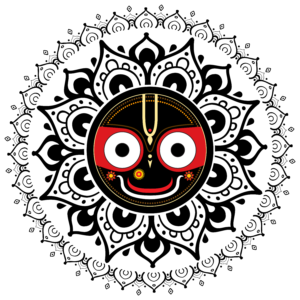
[ad_2]






